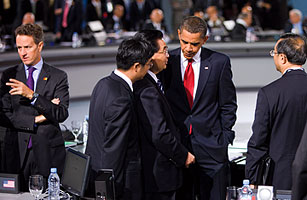
In friendlier times
The G-2 convenes on the sidelines of last year's G-20, held in Pittsburgh
We were supposed to be entering the era when there would be just a party of two at the grown-ups' table: the place where the real power lies and where the key decisions get made. The U.S. and China — the world's strongest developed nation and the world's fastest-growing major developing economy — were going to partner quietly to resolve some of the world's biggest ills. Climate change. Rebalancing the global economy. Reworking the world's financial architecture. No one ever called it the G-2 in public — why insult Europe, Japan, India and everyone else? But every time a senior U.S. official went to Beijing for meetings, the point was pretty clear: Now, the important business gets done.
That era is on hold. The U.S. and China aren't solving problems; they are trading trans-Pacific insults that have given a jarring, Cold War – era tinge to a distinctly 21st century debate: Just how free should the Internet be, and to what lengths can governments go to exploit it for its own aims? The trigger, of course, for the current war of words between Washington and Beijing was Google's Jan. 12 declaration on its website that it would no longer agree to censor its search engine in China. Google said it believed the authorities were behind a series of cyberattacks against its computers, including probes designed to steal the Gmail addresses of human-rights activists and other dissidents inside China. (Beijing denied any state involvement in the cyberattacks.) U.S. Secretary of State Hillary Clinton then followed with a high-profile speech on "Internet freedom," which took direct aim at Beijing, among others.
In the immediate aftermath of Google's announcement, Beijing was conspicuously quiet. In part, this was because the authorities were unclear over how to respond. Says one Chinese Internet executive: "Are there security types in the government who would shut down the Internet tomorrow if they could? Sure there are. But there are also [policymakers] who want China to be a modern, tech-savvy country, and having Google threaten to walk out isn't exactly helpful." However, once it became clear to Beijing that this was not only Google's fight but one that Washington would adopt, China fired back. Said a Jan. 25 editorial in a state newspaper: "In the eyes of American politicians, only when information is controlled by the U.S. does it count as free information."
International commercial spats involving China are increasingly common as it becomes ever more integrated into the global economy. But none have so quickly attained the white-hot intensity of the Google fracas. The Mountain View, Calif., Internet giant openly flouted one of the cardinal rules of dealing with China: no matter what the dispute, quiet backroom diplomacy is the only way to deal with the rulers in Beijing. That is truer for large corporations than it is for governments, because the China market just doesn't stop growing, not even, as 2009 demonstrated, in the teeth of steep global recession. For one of the most powerful companies in the world to publicly assail the Chinese government, and effectively threaten to abandon the China market unless Beijing stops censoring the Internet, was not only unprecedented, "it was astonishing," says the head of China operations for a FORTUNE 500 company.
The Bigger Picture The public démarche provided more than shock value. For much of 2009, China was rightly lauded for keeping its economy humming, enabling it to be a growth engine for the rest of the world. But in a way that could not have been anticipated — least of all by Beijing's leaders — the Google issue has crystallized a whole range of discontent with China, economic and otherwise. "To a degree, it has put a punctuation mark on what has been a very bad run of publicity for China," a top Western diplomat in Beijing says. Some of that discontent has been very public. The sentencing of dissident Liu Xiaobo to 11 years in prison and the controversial execution of a British citizen of Pakistani descent, convicted of being a drug trafficker, angered human-rights activists, while many environmentalists — fairly or not — hung the failure of the Copenhagen climate-change summit around China's neck. With awareness, as well as concern, growing about the country as a world power, China's global role is certain to be dissected and debated at gatherings like the World Economic Forum in Davos.